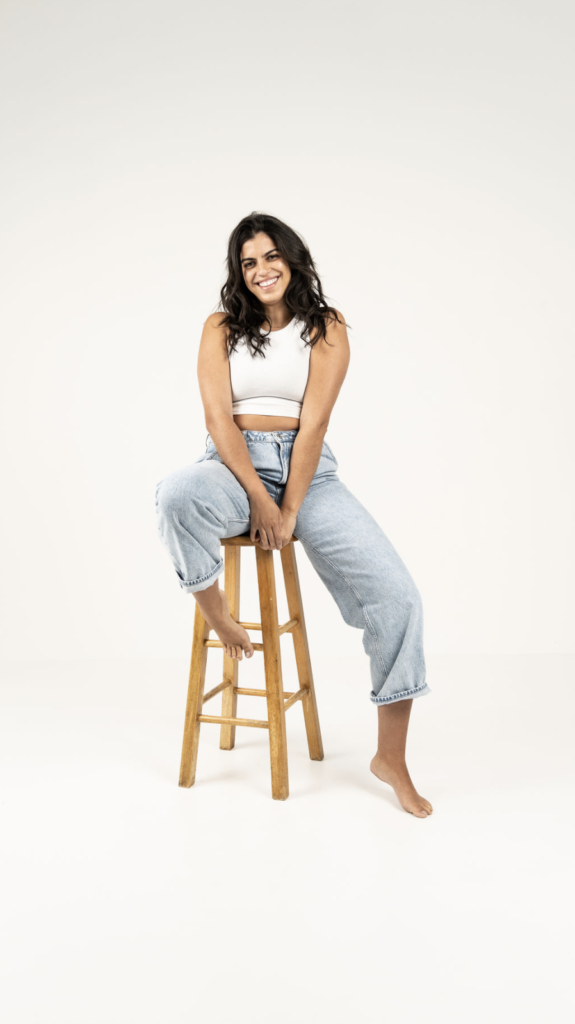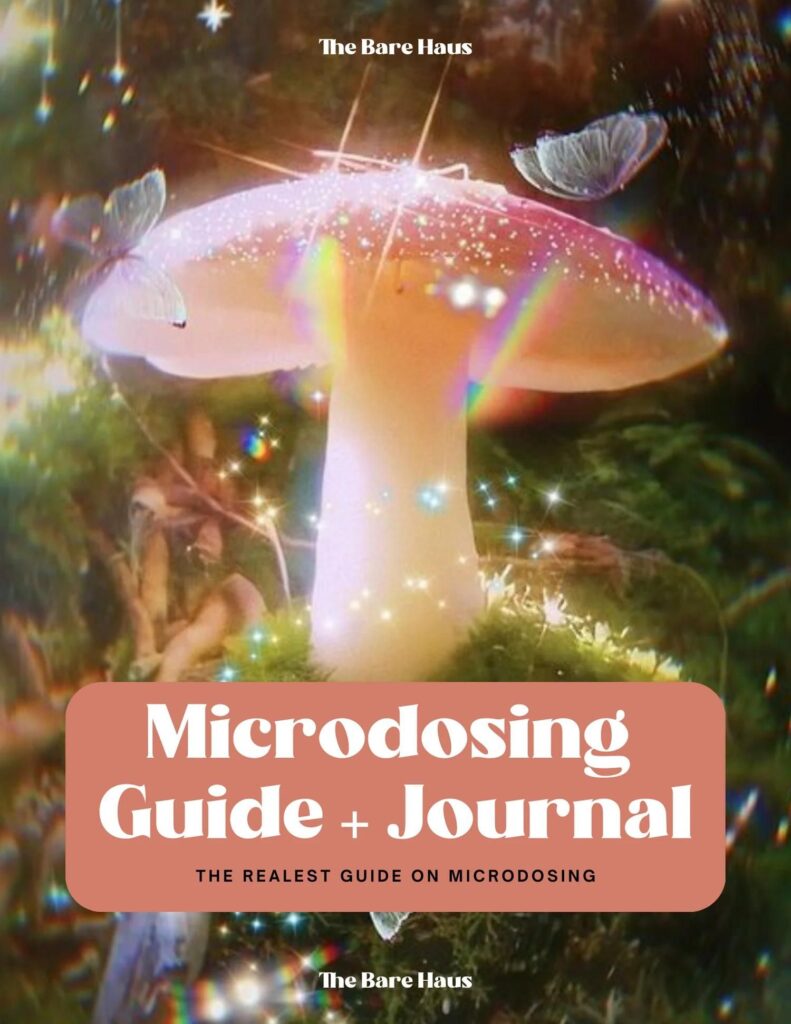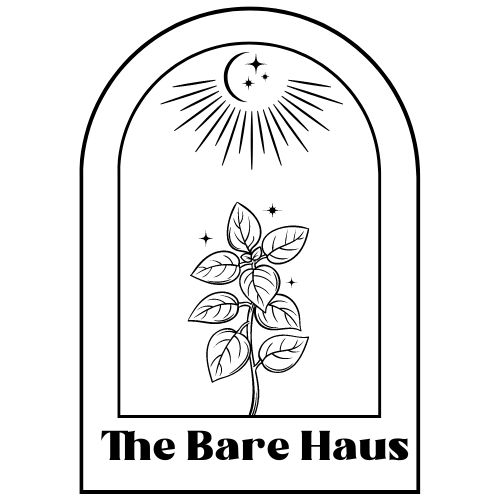Foreword
If you —like me— are a bit of a novice in the “plant medicine” space, the article below may be of use. We’re discussing microdosing psychedelics for therapeutic purposes, specifically the psilocybin found in “magic mushrooms.”
It seems like all the high-profile tech founders and wellness girlies are microdosing. And while I’m not averse to trying something off the beaten path, I thought it best to do a bit of research first.
I invited Samantha Burgos—founder of The Bare Haus—to contribute a piece on some of the most common myths about microdosing. Due to its legal status, there is a lack of studies around the medicinal properties of psilocybin. However, indigenous cultures have used the psychedelic properties of mushrooms for centuries.
Following my depression diagnosis at age 9, I struggled to find my footing for many years. An aversion to prescription medicine meant that my treatment options were limited. Over the years, I’ve found what works for me. Talk therapy and CBT (Cognitive Behavioral Therapy) helped to a point. For the most part, I am able to maintain a stable positive mood without outside intervention. This is down to a somewhat complex yet ultimately simple mix of practices: somatic therapies, strong community ties, a rigorous gratitude practice and and what De La Heart founder Gigi Vogel refers to as “MEDS”: meditation, exercise, diet and sleep.

Psychedelics + Mindfulness
I’m happy with my results, but isn’t it human nature to wonder if it’s possible to be even happier? Meditation and hypnosis have been found to produce beneficial neurochemical effects in the brain. However, these effects have been show to be distinct from the benefits produced by psilocybin and LSD.1
It is posited by some that combining mindfulness and psychedelics can produce faster results, with the psychedelics acting as a compass (initiating, motivating, and steering the course of mindfulness practice) and mindfulness interventions such as meditation serving as a vehicle (integrating, deepening, generalizing, and maintaining the novel perspectives and motivation instigated by psychedelic experience).2 At a time when the collective mental health in the U.S. is at an all-time low, speed and efficacy are key considerations.
I’m excited to feature Samatha on LVDZ to help remove some of the stigma around microdosing. Below, she will debunk some of the most common myths surrounding the practice.
Samantha Burgos: 5 Myths about Microdosing
My name is Samantha Burgos (@sami_burgos) and I am the founder of The Bare Haus (@thebarehaus) which is a space for self-evolution. It is a hub for women who are health-conscious, spiritually woke, and self-aware. The Bare Haus was founded during the pandemic when I was going through my journey with self-awareness and self-love. As a holistic health coach for many years, I knew that there was so much more to our well-being than just movement and plant-based nutrition; that there is a spiritual and mental aspect to wellness that needed to be talked about and honored, as well.
I created an apothecary within The Bare Haus to share natural remedies with my community. As time went on, I found myself in Miami and facing challenges that led to anxiety and depression. For months, I dealt with this. Refusing to look to big pharma for a solution, I did my research and came across microdosing. After much speculation, reading medical journals, and joining psychedelic communities I felt safe to give it a try. After about 2 months my depression and anxiety did a 180° and that is when I knew I had to add this medicine to my shop.
Microdosing is surrounded by so much stigma and hype but I am here to address all the rumors.

Myth #1 You will be “tripping” if you microdose
You will never trip from a microdose. To provide context, a “microdose” is roughly .1 to .3 of a gram of any substance. In the case of magic mushrooms, when you go on a “trip” you’d normally take 1.75 grams to 3 grams. Some people take even 5 grams. The Free Yo Mind capsules have .2 which is right in the middle of the microdosing range.
Myth #3 You will become addicted to psychedelics
This simply isn’t true. Even while microdosing, it is not recommended to take it every day because your body will build tolerance. That is why the two most common “protocols” or methods of microdosing are the Stamets and Fadiman methods which include on and off days.

Myth #4 Microdosing is a placebo or a bandaid fix
In all fairness, aren’t pharmaceuticals a bandaid fix? What microdosing will do is connect you deeper to yourself and shine light on what is at the root of things, to what is under the bandaid. It helped me see that the root of my depression at the time was that I had abandoned myself in some areas of my life. I was able to do something about it after I had become aware. There are a few states that have legalized psychedelic therapy because it is that powerful. It’s the combination of psychedelics with talk therapy, so you will get benefits from journaling or talking out loud.
Myth #5 You will never know what to expect when you take it
It all depends on if you are taking the same amount each time. I have always microdosed with capsules because I know the exact amount I am taking, unlike honey or tea. At The Bare Haus, we weigh every capsule before packaging to make sure that there are .2 grams in each that way you can know what to expect. What you can expect are feelings of happiness, being present, connected, and more easygoing.
Myth #5 Microdosing will make me a bad parent, partner, friend, etc.
First off, what others think about you is not your problem. I know it is easier said than done but there is nothing wrong with looking into alternative medicine. It is totally okay to seek natural remedies as a way to support your healing, enlightenment, and health. I remember I spoke to a woman who told me she was miserable and felt stuck in her life and marriage but she was a drug counselor and because of this, she felt like she was being a “bad” person if she microdosed. I told her that it’s her life and she can do whatever she wants. We all owe it to ourselves to live our most authentic life.
La Vie de Zee Exclusive: To save 15% on purchases from The Bare Haus, use code LVDZ


Click here to return to the homepage.
- “Exploring what happens in the brain under the influence of psychedelics, while meditating and during hypnosis” Medical Express. Quoting a paper published in Biological Psychiatry: Cognitive Neuroscience and Neuroimaging. August 4, 2023. https://medicalxpress.com/news/2023-08-exploring-brain-psychedelics-meditating-hypnosis.html
- Jake E Payne, Richard Chambers, and Paul Liknaitzky (2021). Combining Psychedelic and Mindfulness Interventions: Synergies to Inform Clinical Practice. ACS Pharmacology & Translational Science 4(2): 416–423.
